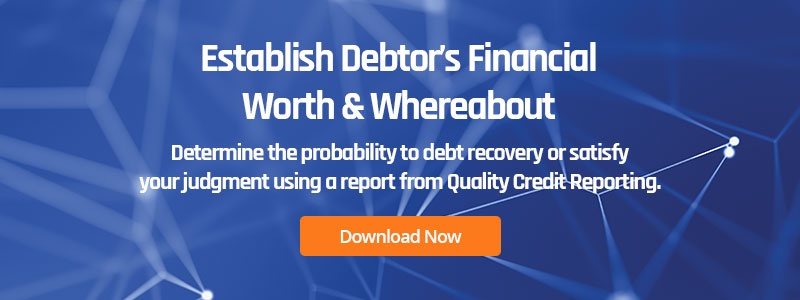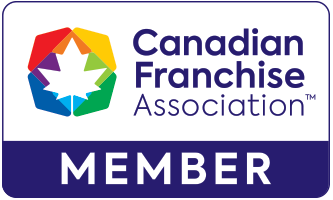You need the best information possible prior to launching a legal action against a debtor or attempting to enforce a judgment. The defendant’s financial worth will significantly impact the likelihood of recovery.
Obtain the accurate picture of the defendant’s circumstances so that you will know if the legal costs incurred are going to be justified by successful collection. Guesswork is risky for the outcome and unnecessary. Take the extra step by using Quality Credit’s Asset Accumulation Report and make an informed decision regarding next actions.
Establishing a debtor or defendant’s financial worth and whereabouts is key when considering launching a legal action or when trying to enforce a judgment.
At the end of the day, you are not just looking at the number of assets your debtor has on hand, you are looking at your ability to collect on them. Your debtor could have all the asset’s in the world but you may never be able to collect on them due to previous attachments and creditors.
If you fail to determine this information in advance, your legal actions could cost you more than you can collect.
As such, by determining the defendant’s worth, you can obtain valuable information to help you make the best possible decision at any stage of the legal process, including:
- Prior to commencing a legal action
- During pre-litigation settlement discussions
- When preparing for Discoveries
- During post-litigation settlement discussions
- After obtaining judgment to assist enforcement
- When preparing for an Examination in Aid of Execution
Various assets of interest, when preparing for legal action include:
Real Property
You will want to locate real property assets and identify whether or not the property is registered to the debtor, encumbrances registered on title and if there are any fraudulent conveyances.
Personal Property/Motor Vehicles
Similar to real property, you will want to identify whether or not there is any personal property, such as motor vehicles, equipment, goods, inventory and accounts that can be collected, and whether these assets are held in the name of the debtor, or if they are secured by other creditors.
Business Interests / Affiliations
Next, you will want to locate the debtor’s business interests. You can often find co-debtors and co- defendants that link the debtor to other companies and businesses that hold substantial assets.
Bank Accounts
It is important to identify banking relationships, as they can be useful for garnishment during the debt recovery process.
Rents
Rent is an additional source of income that could exist and should be checked for during the investigative process.
Wages
Similar to Bank Accounts, knowing the debtor’s place of employment and sources of income can assist with garnishments during debt recovery.
In addition to uncovering assets, you will also want to identify the various liabilities held by the debtor. This will provide a larger picture and offer additional information that will help determine whether or not you should proceed.
Tax Liens
A tax lien is a legal claim against property and assets for an unpaid amount. Assets with a lien cannot be sold or refinanced until the amount has been paid. Liens can be placed for unpaid PST, Corporation Tax, RST, HST and GST.
Collections
Before proceeding with legal action, you will want to establish current and historical collection actions.
Pending Legal Actions/Judgments
Similarly, you will want to identify pending legal actions and judgments, as well as their particulars.
Credit Card Balances
Many debtor’s often have credit card debt that should be considered.
Secured and Unsecured Borrowing Facilities
Secured debt is backed by collateral to reduce the risk of lending for creditors, whereas unsecured debt is not. Identifying various secured and unsecured debts, including term loans and operating lines, is important.
Mortgages
Mortgages are a common type of secured debt held by companies and individuals. By confirming registered mortgages and executions on real property you will get a broader picture of collectability.
Bankruptcies, Consumer Proposal and Receiverships
Located through Superintendent of Bankruptcy, bankruptcies, consumer proposals and receiverships can affect your ability to collect on debt.
In addition to all of this information, you will want to locate the debtor’s address for service, as well as employment confirmation for garnishment purposes.
At Quality Credit Reporting, we have years of experience helping companies evaluate a debtor’s status, specializing in timely reports that assist in pre-judgment collections and post-judgment recovery.
Our “Asset Accumulation Report” is an excellent decision making tool for lawyers and their clients when trying to identify this information. It will give you the answers you need, prior to launching the action, entering into settlement negotiations or satisfying the judgment.
This report is the most comprehensive product offered in today’s legal marketplace and has been successful in assisting the legal professionals in making the right decision when planning the course of action and preparing for settlement negotiations.
For more information, contact us, or get a quote today!
Tags: Recovery / Legal





